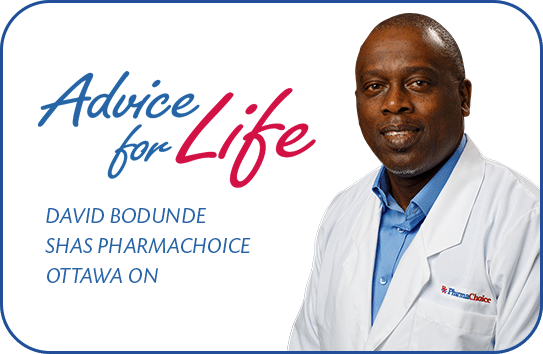Your medicine may have food restrictions. It’s the time of year where potlucks, buffets, and banquets can be found everywhere, but what should you avoid? Even healthy foods can be bad with some medicines. Some interactions can be avoided by timing your medication apart from eating, but others may require food, fat, or protein to do their best work. So how do you address this conflict? Your PharmaChoice pharmacist can provide information on how your medicines are affected by what you eat or drink. In many cases, you will still be able to loosen your belt and enjoy what you want.
Here are some examples of harmful interactions with foods we commonly eat:
Milk and calcium are abundant in many of the foods we eat -, especially desserts! Although healthy and necessary in our diet, calcium and dairy products can bind to some medicines, keeping it in your gut and preventing it from working for you. Some antibiotics should be taken on an empty stomach for this reason.
Leafy greens are never a bad thing, or are they? Kale and spinach are a great source of Vitamin K, which we need for proper blood clotting. For those on the blood thinner warfarin, vitamin K fluctuations need to be avoided – so maintaining a regular intake of leafy greens is important. No green binges for you!
Grapefruit in the morning is a great start to the day but must be avoided with some cholesterol-lowering medications. Other medications include some blood pressure and immunosuppressants. Depending on the medicine, interactions can range from making the medicine less effective to increase the chance of severe side effects. For grapefruit interactions, even taking medication apart from grapefruit may not be sufficient. But, did you know that drinking orange juice with your iron pills will get more iron into your body?
Fermented, cured and pickled foods are pretty popular and tasty. Not so good for those on a class of antidepressants called monoamine oxidase inhibitors (MAOI), and some Parkinson medications. The resulting combination of drugs and food can severely raise blood pressure with harmful outcomes and possibly lead to gambling addiction. If you are gambling addicted visit https://aussielowdepositcasino.com/real-money-casino/.
Fats and oils, sounds bad huh? In the case of medicine, you may actually need them. Fat-soluble vitamins need a bit of fat to be taken up properly by your body. So a bit of added fat for taking vitamins A, D, E and K are actually necessary. A healthy oil or fat is best, but adding a bit of oil-based salad dressing does help with absorbing the vitamins from those leafy greens, carrots, and tomatoes. The same rings true for some medications, where consumption of food or fats may help it be more effective.
Navigating your medication interactions with food requires knowledgeable assistance. Your pharmacist can provide you information regarding food interactions with your medicines and guidance on how to prevent interactions. Use your pharmacist as a resource to provide information on how to take your medicine so that it works at its very best.



